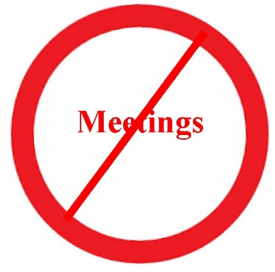Productivity experts hold the number 1440 on a banner and wave it high. Why? 1440 is the number of minutes in a day.
Lost wealth can be re-earned. Lost health can be recovered. Lost relationships can be repaired. But time is something you can never recoup.
To achieve the most productive day, many experts put forth a variety of ideas and tools. Finding the right combination of these tools that work best for you is the challenge.
With that in mind, here are a few things to remember that can make your 1440 minutes more productive:


Mark Cuban, a serial entrepreneur and Shark Tank investor, is quoted saying “The only way you’re going to get me for a meeting is if you’re writing me a check.” That philosophy is simple for Mark to achieve, since he is often the one who writes the checks, but that doesn’t necessarily apply for the rest of us.
That said, here are some tips to help keep your meetings more productive:
- Prepare and stick to the agenda – Any tangential conversation should be cut off.
- Start on time – Don’t wait for the late arrivals, which many experts call time thieves. Seven people waiting for even ten minutes for one arrival is a waste of a combined 70 minutes.
- End early – Attendees will feel they received a spirit-lifting bonus.
- Consider not holding a meeting – Some attendees may agree that they are a waste of time, especially if it’s involving an issue that can be done via email
We all have goals and they often change with time. Some may change weekly, others less frequently. Identify your top 2-3 goals and make sure every day you focus on each. Not only does this enhance reaching those goals, the feeling of satisfaction will energize you (no, really, it will!)
We often think all time is equal. Not so. Many of us are more productive in the morning. Others in the afternoon. Identify that time period for you and use it to focus on the heavy lifting tasks. Leave the simpler ones for other points in the day.
If helpful, use your calendar to block out time for your tasks. Find the optimum timespan you can highly focus. At first, you may need to experiment with the length of time you can stay highly focused. Don’t forget to schedule breaks after those intervals.
Starting with your most important focuses, enter each activity you need to accomplish into those work breaks on your calendar and then stick to it! If time is up and you’re still working on a task, put it aside and move on. If you don’t, you’re cheating the system and, believe it or not, you’ll accomplish less. Leave yourself hungry for more!
Make sure you schedule time (but not a lot) for admin work (emails, returning phone calls and the like). Other than admin time, don’t look at email and don’t answer the phone. Even more helpful is to shut off notifications and place your phone on silent.
Don’t schedule two meetings back-to-back. Leave some empty slots for emergencies – both personal and business.
Some schedule their entire day, some their professional day. Find what works best for you. For more information about this technique, you can read Cal Newport’s book Deep Work.

As the driver in your business, your time is valuable. Evaluate your tasks, both ad hoc and routine, and find someone else to do them. Who cares if it takes them longer than it would take you? Your time is more valuable!
You cannot do everything; Thinking you can, actually hurts you and slows the growth of your business. With some careful planning and diligent review, you can make sure you’re protecting your time and helping the business grow.
